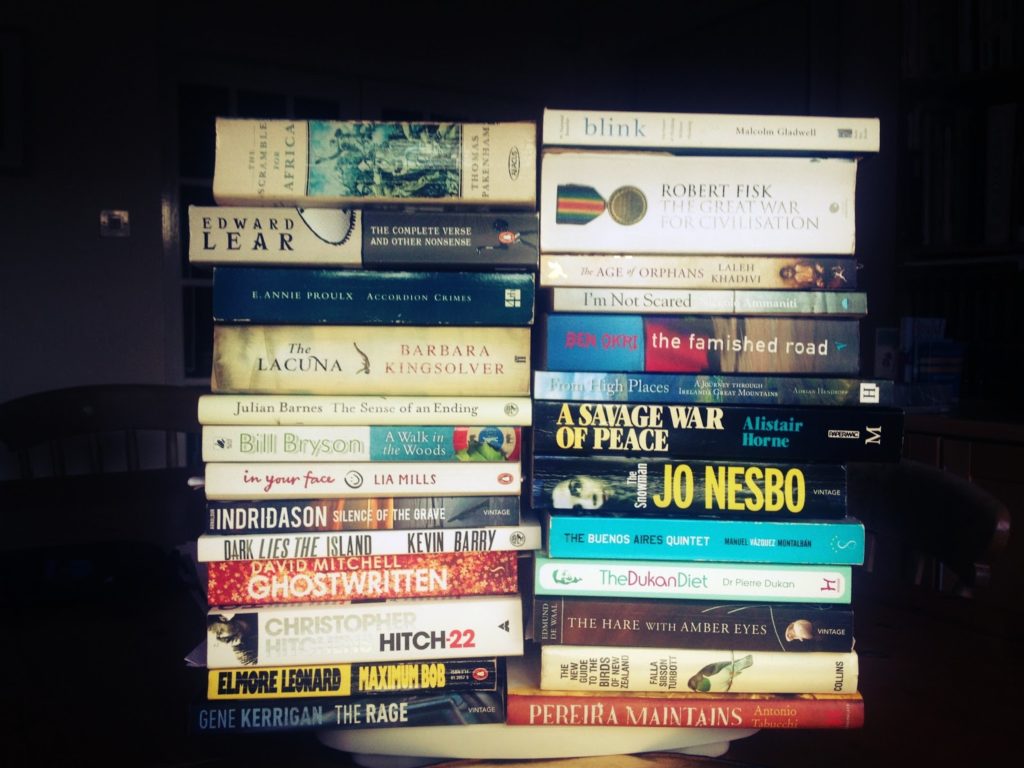Do you ever wonder where your books end up after they leave your shelves?
At one point in my career, I would leave some of the novels I’d finished in airplanes or airports. I realised that English language books ended up in other language skips so I only left them in English speaking destinations.

Then I came across an appealing concept and started leaving them in airport lounges with a note on the inside. The note referred to registration with BookCrossing hoping that I could track each of the books as they travelled the world. I imagined that the journey of the books would become stories in themselves.
Not one book was ever re-registered so I gave up after a year or so. I recall leaving a copy of my wife’s first book Another Alice in an exposed overhead air-duct in Dublin Airport. There was some building work at the time so I don’t know if it’s still there or what its fate might have been.
Other books that I recall are those that I lent that were never returned. My mind stores such books much like it works with photographs. In the case of photographs, I can recall with some clarity many of the best shots I never took and yet, the details in some of the best photos I have made are forgotten. Of course I know this is a cognitive bias. I know that my brain has filtered details during memory storage. I know that if I retrieve a photo from my database that I see things long discarded by my brain. I presume there is a metadata facility in my memory that tags items with concepts like regret or or frustration or anger. So the memory on retrieval is coloured or prioritised in response to these terms. I regret the photos I didn’t take so I recall them. I regret the loss of a book or perhaps what I regret is the lack of the return.
Books I have loaned that I regret include Reading the Rocks: The Autobiography of the Earth by Marcia Bjornerud. I can get another one but I’m surprised at the guy I lent it to. Another is Weapons of Math Destruction: How Big Data Increases Inequality and Threatens Democracy by Cathy O’Neil. Obviously I lent them because they were very good. My instinct, perhaps my real regret, is that these books probably weren’t returned because they weren’t read by the borrower. They remain on ‘to do’ lists.
Weapons of Math Destruction came up in a Euronews interview today and that’s what seeded the theme of this blog. It was shortlisted as a book of the year in 2016 for very good reason. The author is a data scientist and her book tells us how algorithms are increasingly regulating people. It was a great read, especially the part about how predictive policing uses the probability of recidivism to postpone parole. What are human rights when you are (African) American?
The context in the news is the British roll back of algorithmic school grading. The algorithm was incorrectly weighted by the human committee or programmer and was punishing high achievers in poor schools, among other failings.
O’Neil also writes the mathbabe.org blog that I read from time to time.
Back in March she opined:
‘The aftermath of the coronavirus is likely to include a new political uprising—an Occupy Wall Street 2.0, but this time much more massive and angrier. Once the health emergency is over, we will see the extent to which rich, well-connected and well-resourced communities will have been taken care of, while contingent, poor and stigmatized communities will have been thoroughly destroyed. Moreover, we will have seen how political action is possible—multitrillion dollar bailouts and projects can be mobilized quickly—but only if the cause is considered urgent. This mismatch of long-disregarded populations finally getting the message that their needs are not only chronically unattended, but also chronically dismissed as politically required, will likely have drastic, pitchfork consequences.’
This is published online on Politico along with a myriad of other opinions. I liked this story because I know from a brief flurry of professional machine learning research that algorithms easily demonstrate how unaided expert human predictions are not much better than informed guesses. O’Neil is a data scientist who is predicting a very bleak future among a bunch of other field experts, most of whose opinions are so diverse as to be almost meaningless noise just five months later. Am I a catastrophist if I have more sympathy with her predictions than with the opinions/prediction of the other contributors?
[Here’s an easy read article by Deloitte that I found useful when I was working on finding applications for AI in geoscience.]
I stumbled over a link to Geograph in Favourites in a browser I rarely use. It may be of interest if you are in Britain or Ireland with a few minutes to spare on a desktop and you like photographs. The 2005 concept was to collect and publish an online picture for every Ordnance Survey gridsquare. They now say ‘This map is starting to show its age, it was made over 12 years ago, with what is now old technology; which alas many modern browsers no longer fully support.’ It worked in Safari on a Mac. What I like is that quite a few of the photos are just old enough to remind us of what once was.

It’s interesting that Covid-19 is exposing more clearly how the ‘civilised’ world works. I hope the majority of people see this and decide to create a better world.